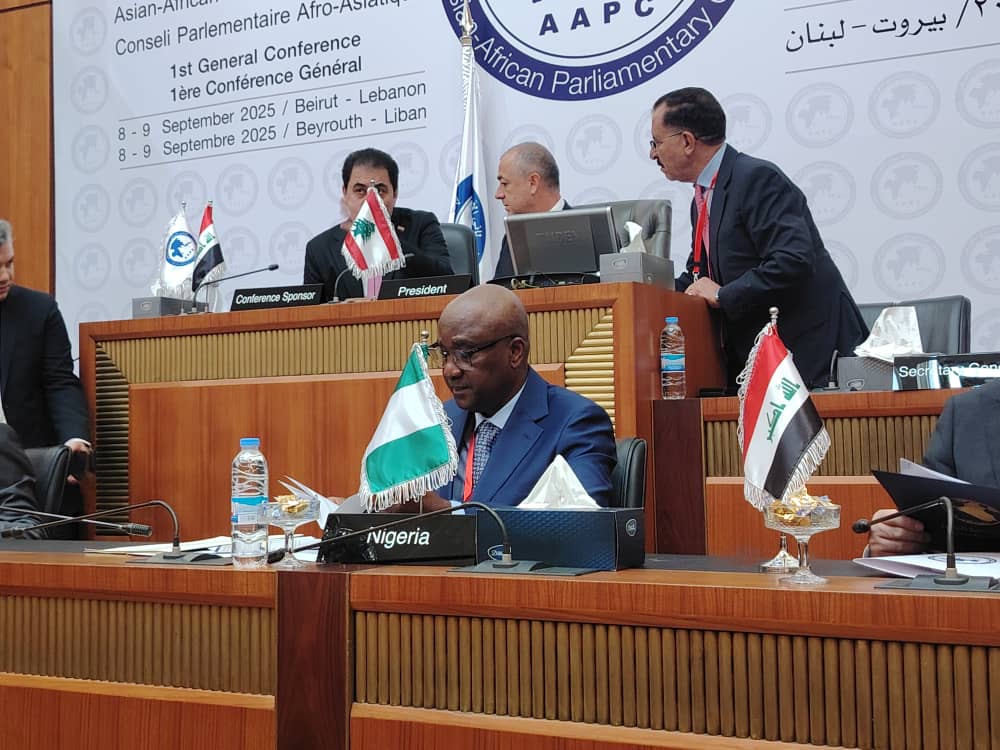…presents scorecard on gender inclusion, AI regulation bills, others
The Speaker of the House of Representatives Hon. Abbas Tajudeen, has called for trade and investment frameworks between Africa and Asia, especially for green energy and digital economies.
This is just as the Speaker has stated that the proposed Asian-African Parliamentary Council, which he approved, will enable African and Asian parliaments to address shared challenges and amplify the voices of the two continents in global affairs.
Speaker Abbas made this known in his remarks at the ongoing First General Meeting of the Asian–African Parliamentary Council holding in Beirut, Republic of Lebanon. The event is slated for September 8 and 9.
Addressing African-Asian lawmakers at the Lebanese Parliament on Monday, the Speaker said, “I urge us all to prioritise establishing frameworks for investment, trade, and the exchange of ideas. Africa’s resources should complement Asia’s progress in green energy and digital economies. In a changing world, our parliaments must lead the way in fostering partnerships based on opportunity and innovation.”
While commending the gathering for “this visionary initiative to establish the Council,” Speaker Abbas noted that it is “a timely platform for parliamentary collaboration amid evolving global dynamics characterised by shifting geopolitics, multipolarity, and nationalistic economic policies and trade protectionism.”
He added that it “enables us to address shared challenges such as inequality, climate change, and sustainable development, amplifying the voices of Asia and Africa for justice and equity in global affairs.”
The Speaker, who noted that the agenda of the meeting captures the essence of the Asian-African Parliamentary Council, said Nigeria is eager to participate constructively in the sessions.
He said, “We aim to foster parliamentary cooperation to address shared challenges and enhance our collective resilience. We are interested in discussions on justice and sustainable development, which align with President Tinubu’s Renewed Hope Agenda.
“The agenda supports initiatives such as environmental sustainability policies, climate resilience projects, and poverty alleviation efforts. We also highlight the importance of international blocs, building on our recent acceptance as a BRICS partner country in January 2025, to foster South-South cooperation and economic opportunities with Asian nations.”
While recalling the relationship between Asia and Africa, rooted in anti-colonial solidarity like the 1955 Bandung Conference, Speaker Abbas said it becomes more urgent in today’s contexts of technological advances and shifting alliances.
Through this council, he said, “Parliamentary diplomacy can promote fair trade, innovation, and mutual respect; reduce dependencies; and establish norms on climate and digital governance.”
The Speaker also pointed out that Nigeria has historically supported relations between Asia and Africa, and the country is a founding member of the African Union and the Non-Aligned Movement.
He stressed that Nigeria has championed decolonisation and partnerships through forums such as the Forum on China–Africa Cooperation (FOCAC), and the Tokyo International Conference on African Development (TICAD).
He said, “Under President Bola Ahmed Tinubu, Nigeria has further strengthened its efforts. In 2024, we entered into a strategic partnership with China focused on agriculture and infrastructure. Additionally, Nigeria signed MoUs with India in 2023 to enhance trade under the African Continental Free Trade Area (AfCFTA). Nigeria aims to expand these initiatives through this council and seeks to improve legislative oversight.”
Speaker Abbas explained that the Nigerian National Assembly, especially the House of Representatives, anchors the Renewed Hope Agenda by aligning its Legislative Agenda to focus on governance, security, economic growth, social reform, inclusion, open parliament, foreign policy, and sustainability.
“We have supported the removal of subsidies, freeing funds for infrastructure and education in the 2025 budget. We have enacted laws on human rights, gender-based violence, and disabilities.
“In promoting gender inclusion, the 10th House has prioritised the Reserved Seats for Women Bill, which proposes creating special seats in the National Assembly (Senate and House of Representatives) and across all State Houses of Assembly.
“This temporary measure, set for review after four election cycles (16 years), aims to address the significant under-representation, where women currently hold only 64 of 1,460 parliamentary seats nationwide. It seeks to strengthen democracy, reduce gender-based abuses, and unlock Nigeria’s full potential,” he said.
Embracing the digital age, the Speaker said the 10th House is integrating technology and AI to improve parliamentary processes through digital platforms that promote transparency and efficiency in the National Assembly, as highlighted in our collaborations with the Inter-Parliamentary Union (IPU).
Speakers at the opening ceremony include the President of the Founding Council and Deputy Speaker of the Council of Representatives of Iraq, Mohsen Al-Mandalawi; Speaker of the Lebanese Parliament, Nabih Berri; President of the International Confederation of Asia and Africa Trade Unions, Saud Rashid Al-Hujailan; First Vice-President of the National Assembly of Mauritania, Sid’ni Soukhona;
At the ceremony, the lawmakers adopted the provisional draft agenda of the meeting, while they had a general debate on the idea of establishing the Asian–African Parliamentary Council, with a focus on the importance of international blocs.
There was also a presentation of the council’s strategic plan and submission of proposals and a presentation of the draft final communiqué.

